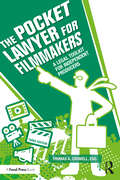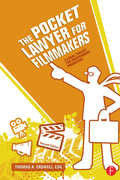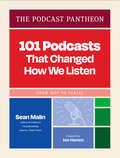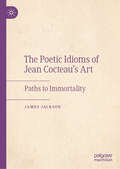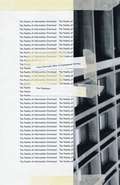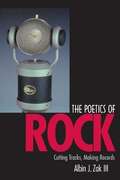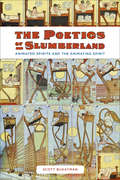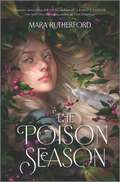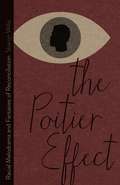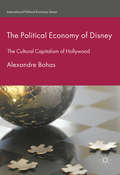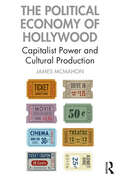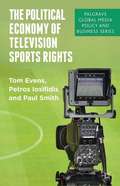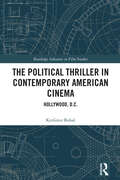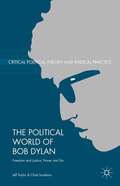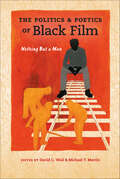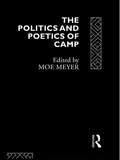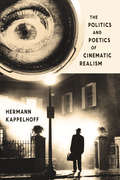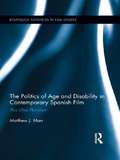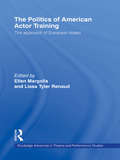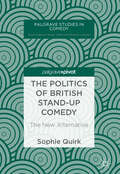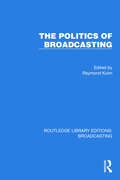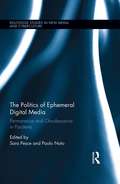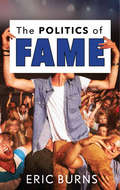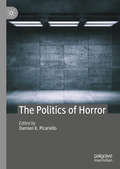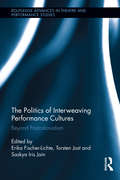- Table View
- List View
The Pocket Lawyer for Filmmakers: A Legal Toolkit for Independent Producers
by Thomas A. Crowell, Esq.This no-nonsense reference helps independent filmmakers recognize and solve the critical legal issues they might face throughout the course of making a film. Author Thomas A. Crowell, TV producer turned entertainment lawyer, will help you to understand and negotiate crucial production contracts, handle actors and their agents, and navigate the perils of copyright infringement and other lawsuits. Updated throughout to address important changes to the law, and incorporating discussion of online distribution, crowd funding, social media marketing, and international productions, this expanded third edition will provide you with the skills to: Protect the copyright to your work. Finance your film and watch out for common financing traps. Understand how tax credits and other incentives are used in film financing. Work with other screenwriters, and protect your script ideas. Adapt a book or comic into a screenplay. Know how to spot the difference between copyright infringement and fair use. Hire crew members, actors, and post-production staff. Draft a production services agreement or a license to use someone else’s work. License music for soundtracks. Negotiate a distribution agreement or understand how to distribute your film alone. Learn how to best position your film for Netflix. Make money from YouTube. And much more! Written for accessibility and ease of reference, this book is a vital resource for any student or independent filmmaker wanting their films to be successful and free of legal disasters.
The Pocket Lawyer for Filmmakers: A Legal Toolkit for Independent Producers (Pocket Lawyer Ser.)
by Thomas A. Crowell* How can you use a state's film tax credits to fund your film? SEE PAGE 63. * You have an idea you want to pitch to a production company; how do you safeguard your concept? SEE PAGE 77. * How can you fund your production with product placement? SEE PAGE 157. * How do you get a script to popular Hollywood actors and deal with their agents? SEE PAGE 222. Find quick answers to these and hundreds of other questions in this new edition of The Pocket Lawyer for Filmmakers. This no-nonsense reference provides fast answers in plain English-no law degree required! Arm yourself with the practical advice of author Thomas Crowell, a TV-producer-turned-entertainment-lawyer. This new edition features: * New sections on product placement, film tax credits and production incentive financing, Letters of Intent, and DIY distribution (four-walling, YouTube, Download-to-own, Amazon.com, iTunes, and Netflix) * Updated case law * Even more charts and graphics to help you find the information you need even more quickly. This book is the next best thing to having an entertainment attorney on retainer!
The Podcast Pantheon: 101 Podcasts That Changed How We Listen
by Sean MalinSpanning the most popular podcast genres—true crime, comedy, sports, relationships, and more—culture critic and Vulture‘s Start Here columnist Sean Malin introduces the first comprehensive canon in podcast history. Featuring a foreword by award-winning actor and producer Jon Hamm.The Golden Age of podcasts is upon us. With over fifty official podcast networks, more than three million programs of every imaginable category available for download, and tens of millions of unique listens and views every week in the US alone—plus, our favorites being adapted into dozens of beloved films, TV series, and books—podcasts are now part of the fabric that makes up our everyday global media. Finally, here is an exclusive insider’s perspective told through 101 different shows across dozens of genres. The Podcast Pantheon is the first book of its kind: A resource for discovering podcasts and learning more about how this multibillion-dollar industry came into being from the geniuses who created it. Delving into genres of all kinds—including fashion, food, health, sex, tech, and more—Malin profiles all the top podcasts, from Serial to Comedy Bang! Bang!, guiding fans to: Find out more about their favorite shows and how they got started. Learn about each podcast’s influences and impact on culture, history, future shows, and the industry at large. Hear exclusive stories and enjoy never-before-seen behind-the-scenes photos from favorite hosts. Discover hidden gems, whether an entirely new podcast, a new-to-you genre, or something reminiscent of an old favorite. Readers will find podcasts worth listening to and get expert advice on the best episodes to start with, solving one of the biggest and most intimidating hurdles when trying to dive into a longstanding show. Malin’s easy-to-read profiling and titillating exploration of 101 podcasts offers something for everybody, whether you’ve been listening to podcasts for years, are new to them, or are looking to start your own.EXPERT KNOWLEDGE: A culture critic since 2007 and the writer behind Vulture‘s hit podcasting column Start Here, Sean Malin has interviewed and connected with the world’s top podcasters, including Marc Maron, Conan O’Brien, Nicole Byer, Ira Glass, and Jenna Fischer and Angela Kinsey, among many others, and has the inside scoop on the most popular and award-winning podcasts. A MUST-HAVE LISTENER’S COMPANION: Dip in and out of this enticing guide that’s perfect for beginners and serious listeners alike. Profiled podcasts include: WTF with Marc Maron My Favorite Murder Conan O'Brien Needs a Friend Office Ladies Why Won't You Date Me? The Accessible Stall Stuff You Should Know Wait, Wait . . . Don't Tell Me! How Did This Get Made? Fresh Air The Moth S-Town Hollywood Handbook Doughboys Bad with Money Welcome to Night Vale And many more! FAN FAVORITES AND NEW DISCOVERIES: Sean Malin reveals fascinating information about 100+ shows and their talented hos
The Poetic Idioms of Jean Cocteau’s Art: Paths to Immortality
by James JacksonCocteau had an ambition many a poet has: to become immortal. But he, perhaps more than most, addressed this ambition directly in a great many of his plays, poems, and films. This book puts the work of this elusive and compelling poet under the microscope, examining how he channeled the concerns and anxieties of his age (and beyond) into his creations. Putting aside anecdotes of his life and other biographical minutiae, it turns to the creative achievements of the polymath – some well-known, some less so – to examine how he wrestles with the profound questions that concern human nature and enters into a conversation with his creative forebears on matters relating to love, imagination, suffering, and consolation.
The Poetics of Information Overload: From Gertrude Stein to Conceptual Writing
by Paul StephensInformation overload is a subject of vital, ubiquitous concern in our time. The Poetics of Information Overload reveals a fascinating genealogy of information saturation through the literary lens of American modernism. Although technology has typically been viewed as hostile or foreign to poetry, Paul Stephens outlines a countertradition within twentieth- and twenty-first-century literature in which avant-garde poets are centrally involved with technologies of communication, data storage, and bureaucratic control. Beginning with Gertrude Stein and Bob Brown, Stephens explores how writers have been preoccupied with the effects of new media since the advent of modernism. He continues with the postwar writing of Charles Olson, John Cage, Bern Porter, Hannah Weiner, Bernadette Mayer, Lyn Hejinian, and Bruce Andrews, and concludes with a discussion of conceptual writing produced in the past decade.By reading these works in the context of information systems, Stephens shows how the poetry of the past century has had, as a primary focus, the role of data in human life.
The Poetics of Rock: Cutting Tracks, Making Records
by Albin J. Zak IIIA fascinating exploration of recording consciousness and compositional process. It examines the crucial roles played by recording technologies in the construction of rock music and shows how songwriters, musicians, engineers, and producers contribute to the creative project.
The Poetics of Slumberland: Animated Spirits and the Animating Spirit
by Scott BukatmanIn The Poetics of Slumberland, Scott Bukatman celebrates play, plasmatic possibility, and the life of images in cartoons, comics, and cinema. Bukatman begins with Winsor McCay's Little Nemo in Slumberland to explore how and why the emerging media of comics and cartoons brilliantly captured a playful, rebellious energy characterized by hyperbolic emotion, physicality, and imagination. The book broadens to consider similar "animated" behaviors in seemingly disparate media--films about Jackson Pollock, Pablo Picasso, and Vincent van Gogh; the musical My Fair Lady and the story of Frankenstein; the slapstick comedies of Jerry Lewis; and contemporary comic superheroes--drawing them all together as the purveyors of embodied utopias of disorder.
The Poison Season
by Mara Rutherford"Mara Rutherford&’s The Poison Season took me on journey through a bloodthirsty forest, where two star-crossed lovers discover the true meaning of poison. It brims with evocative storytelling that left me enchanted!" — Emily J. Taylor, New York Times bestselling author of Hotel MagnifiqueOutsiders are always given a choice: the Forest or the lake. Either way, they&’re never heard from again.Leelo has spent her entire life on Endla, coexisting with the bloodthirsty Forest and respecting the poisonous lake that protects her island from outsiders who seek to destroy it. But as much as Leelo cares for her community, she struggles to accept that her younger brother will be exiled by his next birthday, unless he gains the magic of enchanted song so vital to Endla.When Leelo sees a young outsider on the verge of drowning in the lake, she knows exactly what she&’s supposed to do. But in a moment that will change everything, Leelo betrays her family, her best friend, and Endla by making an unthinkable choice.Discovery could lead to devastating consequences for both Leelo and the outsider, Jaren, but as they grow closer, Leelo realizes that not all danger comes from beyond the lake—and they can only survive if Leelo is willing to question the very fabric of her society, her people, and herself.
The Poitier Effect: Racial Melodrama and Fantasies of Reconciliation
by Sharon WillisThe civil rights struggle was convulsing the nation, its violence broadcast into every living room. Against this fraught background, Sidney Poitier emerged as an image of dignity, discipline, and moral authority. Here was the picture-perfect black man, helping German nuns build a chapel in The Lilies of the Field and overcoming the prejudices of recalcitrant students in To Sir with Love, a redneck sheriff in In the Heat of the Night, and a prospective father-in-law in Guess Who&’s Coming to Dinner. In his characters&’ restrained responses to white people&’s ignorance and bad behavior, Poitier represented racial reconciliation and reciprocal respect—the &“Poitier effect&” that Sharon Willis traces through cinema and television from the civil rights era to our own.The Poitier effect, in Willis&’s account, is a function of white wishful thinking about race relations. It represents a dream of achieving racial reconciliation and equality without any substantive change to the white world. This notion of change without change conforms smoothly with a fantasy of colorblindness, a culture in which difference makes no difference. Willis demonstrates how Poitier&’s embodiment of such a fantasy figures in the popular cinema of the civil rights era—and reasserts itself in recent melodramas such as The Long Walk Home, Pleasantville, Far from Heaven, and The Help. From change without change to change we can believe in, her book reveals how the Poitier effect, complicated by contemporary ideas about feminism, sexuality, and privilege, continues to inform our collective memory as well as our visions of a postracial society.
The Political Economy of Disney
by Alexandre BohasThis book sheds new light on the socio-economic impact of multinational corporations. Combining Cultural Studies and International Political Economy, it provides a revealing analysis of the Walt Disney Company, and by extension the wider Hollywood studio system. It does so by examining the cultural and economic forces powering the industry's expansion, the 'civilisation' that Disney disseminates, and the various ways that societies beyond the USA have adopted facets of the Hollywood productions to which they are exposed. Identifying both the strengths and the weaknesses of these transnational firms, it demonstrates the significance of their contribution to American power and predominance.
The Political Economy of Hollywood: Capitalist Power and Cultural Production
by James McMahonIn Hollywood, the goals of art and business are entangled. Directors, writers, actors, and idealistic producers aspire to make the best films possible. These aspirations often interact with the dominant firms that control Hollywood film distribution. This control of distribution is crucial as it enables the firms and other large businesses involved, such as banks that offer financing, to effectively stand between film production and the market. This book analyses the power structure of the Hollywood film business and its general modes of behaviour. More specifically, the work analyses how the largest Hollywood firms attempt to control social creativity such that they can mitigate the financial risks inherent in the art of filmmaking. Controlling the ways people make or watch films, the book argues, is a key element of Hollywood’s capitalist power. Capitalist power—the ability to control, modify, and, sometimes, limit social creation through the rights of ownership—is the foundation of capital accumulation. For the Hollywood film business, capitalist power is about the ability of business concerns to set the terms that will shape the future of cinema. For the major film distributors of Hollywood, these terms include the types of films that will be distributed, the number of films that will be distributed, and the cinematic alternatives that will be made available to the individual moviegoer. Combining theoretical analysis with detailed empirical research on the financial performance of the major Hollywood film companies, the book details how Hollywood’s capitalist goals have clashed with the aesthetic potentials of cinema and ultimately stymied creativity in the pursuit of limiting risk. This sharp critique of the Hollywood machine provides vital reading for students and scholars of political economy, political theory, film studies, and cinema.
The Political Economy of Television Sports Rights
by Paul Smith Tom Evens Petros IosifidisSport on television is big business. Broadcasters across the world regularly agree highly lucrative deals for the television broadcast rights to cover major sporting events or competitions. At the same time, however, sport is about more than just commerce. Sport is a social and cultural activity practiced and valued by millions of people throughout the world. The Political Economy of Sports Rights examines both the economic and the social significance of sports broadcasting, as well as how each of these contrasting perspectives have led to the extensive regulation of sports broadcasting by national governments and, in the case of many European countries, the European Union. Using a range of national case studies from Europe and beyond, this book highlights the need for a regulatory approach to sports broadcasting that balances the commercial priorities of sports organisations and private media companies with the wider social and cultural benefits to be gained from free-to-air sports broadcasting.
The Political Thriller in Contemporary American Cinema: Hollywood, D.C. (Routledge Advances in Film Studies)
by Krešimir BobašThe Political Thriller in Contemporary American Cinema examines how political thriller films (de)construct and reflect the sociopolitical realities of the second half of the twentieth century, as well as the first two decades of the twenty-first century.The book highlights the convergence between the cinematic narrative, its underlying political discourse, and the audience’s perception of it. Through a critical lens, it analyzes how contemporary films utilize characterization, narrative, and suspense to examine topics of governance, malfeasance, and power dynamics. By referring to films such as The Manchurian Candidate, Zero Dark Thirty, and Snowden, this book traces the evolution of the political thriller, questioning how its narratives mirror issues such as covert operations, the erosion of democracy, and governmental surveillance. In turn, the conspiratorial and underlying paranoid nature of these films serves as a reflection of societal anxieties and a metaphorization of the levers of power in America’s modern-day democracy.Consequently, this book serves as a contribution to the growing body of research on political cinema and the way it simultaneously reflects and shapes political life through its role as a sociocultural phenomenon. In doing so, it invites readers to further delve into the exploration of these films, which represent complex commentaries on the structures of corporations, media, and the military that are predominant in contemporary American society and cinema.
The Political World of Bob Dylan
by Jeff Taylor Chad IsraelsonThis work illuminates, identifies, and characterizes the influences and expressions of Bob Dylan's Political World throughout his life and career. An approach nearly as unique as the singer himself, the authors attempt to remove Dylan from the typical Left/Right paradigm and place him into a broader and deeper context.
The Politics & Poetics of Black Film: Nothing But a Man (Studies in the Cinema of the Black Diaspora)
by Michael T. Martin David C. WallWritten and directed by two white men and performed by an all-black cast, Nothing But a Man (Michael Roemer, 1964) tells the story of a drifter turned family man who struggles with the pressures of small-town life and the limitations placed on him and his community in the Deep South, an area long fraught with racism. Though unmistakably about race and civil rights, the film makes no direct reference to the civil rights movement. Despite this intentional absence, contemporary audiences were acutely aware of the social context for the film's indictment of white prejudice in America. To help frame and situate the film in the context of black film studies, the book gathers primary and secondary resources, including the original screenplay, essays on the film, statements by the filmmakers, and interviews with Robert M. Young, the film's producer and cinematographer, and Khalil Gibran Muhammad, the Director of the Schomburg Center for Research in Black Culture.
The Politics and Poetics of Camp
by Moe MeyerThe Politics and Poetics of Camp is a radical reappraisal of the meaning and discourse of camp. The contributors look at both the meaning and the uses of camp performance, and ask: is camp a style, or a witty but nonetheless powerful cultural critique? The essays investigate camp from its early formations in the seventeenth and eighteenth century to its present manifestations in queer theatre and literature. They also take a fascinating look at the complex relationship between queer discourse and decidedly un-queer pop culture appropriations on film and on the stage. The Politics and Poetics of Camp is an incisive, uncontainable and entertaining collection of essays by some of the foremost critics working in queer theory, from a number of disciplinary perspectives. This book makes a well-timed intervention into an emerging debate.
The Politics and Poetics of Cinematic Realism (Columbia Themes in Philosophy, Social Criticism, and the Arts)
by Hermann KappelhoffHermann Kappelhoff casts the evolution of cinema as an ongoing struggle to relate audiences to their historical moment. Appreciating cinema's unique ability to bind concrete living conditions to individual experience (which existing political institutions cannot), he reads films by Sergei Eisenstein and Pedro Almodóvar, by the New Objectivity and the New Hollywood, to demonstrate how cinema situates spectators within society. Kappelhoff applies the Deleuzean practice of "thinking in images" to his analysis of films and incorporates the approaches of Jacques Rancière and Richard Rorty, who see politics in the permanent reconfiguration of poetic forms. This enables him to conceptualize film as a medium that continually renews the audiovisual spaces and temporalities through which audiences confront reality. Revitalizing the reading of films by Visconti, Fassbinder, Kubrick, Friedkin, and others, Kappelhoff affirms cinema's historical significance while discovering its engagement with politics as a realm of experience.
The Politics of Age and Disability in Contemporary Spanish Film: Plus Ultra Pluralism (Routledge Advances in Film Studies)
by Matthew J. MarrThe Politics of Age and Disability in Contemporary Spanish Film examines the onscreen construction of adolescent, elderly, and disabled subjects in Spanish cinema from 1992 to the present. Applying a dual lens of film analysis and theory drawn from the allied fields of youth, age, and disability studies, this study is set both within and against a conversation on cultural diversity—with respect to gender, sexual, and ethnic identity—which has driven not only much of the past decade’s most visible and fruitful scholarship on representation in Spanish film, but also the broader parameters of discourse on post-Transition Spain in the humanities. Presenting an engaging, and heretofore under-explored, interdisciplinary approach to images of multiculturalism in what has emerged as one of recent Spain’s most vibrant areas of cultural production, this book brings a fresh, while still complementary, critical sensibility to the field of contemporary Peninsular film studies through its detailed discussion of six contemporary films (by Salvador García Ruiz, Achero Mañas, Santiago Aguilar & Luis Guridi, Marcos Carnevale, Alejandro Amenábar, and Pedro Almodóvar) and supporting reference to the production of other prominent and emerging filmmakers.
The Politics of American Actor Training (Routledge Advances in Theatre & Performance Studies)
by Ellen Margolis Lissa Tyler RenaudThis book addresses the historical, social, colonial, and administrative contexts that determine today's U.S. actor training, as well as matters of identity politics, access, and marginalization as they emerge in classrooms and rehearsal halls. It considers persistent, questioning voices about our nation’s acting training as it stands, thereby contributing to the national dialogue the diverse perspectives and proposals needed to keep American actor training dynamic and germane, both within the U.S. and abroad. Prominent academics and artists view actor training through a political, cultural or ethical lens, tackling fraught topics about power as it plays out in acting curricula and classrooms. The essays in this volume offer a survey of trends in thinking on actor training and investigate the way American theatre expresses our national identity through the globalization of arts education policy and in the politics of our curriculum decisions.
The Politics of British Stand-up Comedy: The New Alternative (Palgrave Studies in Comedy)
by Sophie QuirkThis Palgrave Pivot questions how a new generation of alternative stand-up comedians and the political world continue to shape and influence each other. The Alternative Comedy Movement of the late 1970s and 1980s can be described as a time of unruly experimentation and left-wing radicalism. This book examines how alternative comedians continue to celebrate these characteristics in the twenty-first century, while also moving into a distinct phase of artistic development as the political context of the 1970s and 1980s loses its immediacy. Sophie Quirk draws on original interviews with comedians including Tom Allen, Josie Long, John-Luke Roberts and Tony Law to chart how alternative comedians are shaped by, and in turn respond to, contemporary political challenges from neoliberalism to Brexit, class controversy to commercialism. She argues that many of our assumptions about comedy’s politics must be challenged and updated. This book is essential reading for anyone who wants to understand the working methods and values of today’s alternative comedians.
The Politics of Broadcasting (Routledge Library Editions: Broadcasting #28)
by Raymond KuhnThe Politics of Broadcasting (1985) examines the state of broadcasting in a variety of Western democracies from a political viewpoint, written at a time when new telecommunications and information technology revolutionised television and radio. The book describes and analyses the problems faced by politicians and broadcasters in responding to these changing technological and political environments.
The Politics of Ephemeral Digital Media: Permanence and Obsolescence in Paratexts (Routledge Studies in New Media and Cyberculture)
by Paolo Noto Sara PesceIn the age of "complex Tv", of social networking and massive consumption of transmedia narratives, a myriad short-lived phenomena surround films and TV programs raising questions about the endurance of a fictional world and other mediatized discourse over a long arc of time. The life of media products can change direction depending on the variability of paratextual materials and activities such as online commentaries and forums, promos and trailers, disposable merchandise and gadgets, grassroots video production, archives, and gaming. This book examines the tension between permanence and obsolescence in the production and experience of media byproducts analysing the affections and meanings they convey and uncovering the machineries of their persistence or disposal. Paratexts, which have long been considered only ancillary to a central text, interfere instead with textual politics by influencing the viewers’ fidelity (or infidelity) to a product and affecting a fictional world’s "life expectancy". Scholars in the fields of film studies, media studies, memory and cultural studies are here called to observe these byproducts' temporalities (their short form and/or long temporal extention, their nostalgic politics or future projections) and assess their increasing influence on our use of the past and present, on our temporal experience, and, consequently, on our social and political self-positioning through the media.
The Politics of Fame
by Eric BurnsCelebrities can come from many different realms: film, music, politics, sports. But what do all these major celebrities have in common? What elevates them to the status of household names while their equally talented peers remain in relative obscurity? Is it just a question of charisma, or does fame depend more on the collective fantasies of fans than the actual accomplishments of celebrities? In search of answers, cultural historian Eric Burns delves deep into the biographies of some of the most famous figures in American history, from Benjamin Franklin to Fanny Kemble, Elvis Presley to Gene Tierney, and Michael Jordan to Oprah Winfrey. Through these case studies, he considers the evolution of celebrity throughout the ages. More controversially, he questions the very status of fame in the twenty-first century, an era in which thousands of minor celebrities have seen their fifteen minutes in the spotlight. The Politics of Fame is a provocative and entertaining look at the lives and afterlives of America’s most beloved celebrities as well as the mad devotion they inspired. It raises important questions about what celebrity worship reveals about the worshippers—and about the state of the nation itself
The Politics of Horror
by Damien K. PicarielloThe Politics of Horror features contributions from scholars in a variety of fields—political science, English, communication studies, and others—that explore the connections between horror and politics. How might resources drawn from the study of politics inform our readings of, and conversations about, horror? In what ways might horror provide a useful lens through which to consider enduring questions in politics and political thought? And what insights might be drawn from horror as we consider contemporary political issues? In turning to horror, the contributors to this volume offer fresh provocations to inform a broad range of discussions of politics.
The Politics of Interweaving Performance Cultures: Beyond Postcolonialism (Routledge Advances in Theatre & Performance Studies #33)
by Erika Fischer-Lichte Torsten Jost Saskya Iris JainThis book provides a timely intervention in the fields of performance studies and theatre history, and to larger issues of global cultural exchange. The authors offer a provocative argument for rethinking the scholarly assessment of how diverse performative cultures interact, how they are interwoven, and how they are dependent upon each other. While the term ‘intercultural theatre’ as a concept points back to postcolonialism and its contradictions, The Politics of Interweaving Performance Cultures explores global developments in the performing arts that cannot adequately be explained and understood using postcolonial theory. The authors challenge the dichotomy ‘the West and the rest’ – where Western cultures are ‘universal’ and non-Western cultures are ‘particular’ – as well as ideas of national culture and cultural ownership. This volume uses international case studies to explore the politics of globalization, looking at new paternalistic forms of exchange and the new inequalities emerging from it. These case studies are guided by the principle that processes of interweaving performance cultures are, in fact, political processes. The authors explore the inextricability of the aesthetic and the political, whereby aesthetics cannot be perceived as opposite to the political; rather, the aesthetic is the political. Helen Gilbert’s essay ‘Let the Games Begin: Pageants, Protests, Indigeneity (1968–2010)’won the 2015 Marlis Thiersch Prize for best essay from the Australasian Drama, Theatre and Performance Studies Association.
